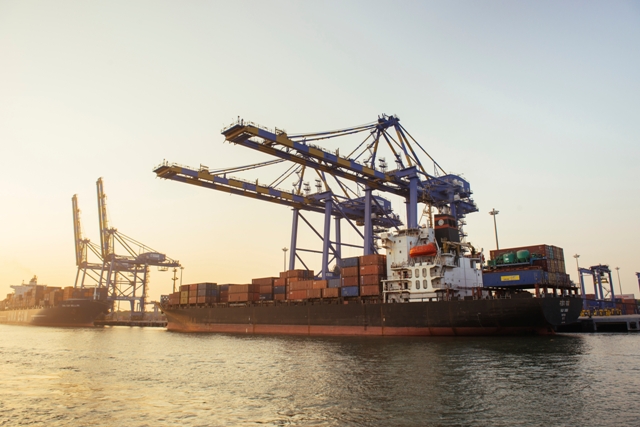 UK exports to Commonwealth countries of goods and services are rising from a low point. [The ICTT, one of India's largest ports. Credit: iStock]
UK exports to Commonwealth countries of goods and services are rising from a low point. [The ICTT, one of India's largest ports. Credit: iStock]
As the heat cools and the dust settles following the decision of the UK to vote for ‘Brexit’ the role of the Commonwealth is attracting new interest—both from the British perspective and from that of the Commonwealth network of member states themselves.
A question one hears asked is whether the Commonwealth of 53 nations, with its growing markets and trans-continental spread, could in any way be for the UK a substitute for European Union (EU) single market membership. A further question is how EU withdrawal by the UK affects all other Commonwealth countries, bearing in mind the strong pre-referendum message from many Commonwealth leaders that the UK should remain, not leave.
In some senses even to pose the first question—comparing the modern Commonwealth network with the European market—is to confuse apples and oranges on a grand scale. The two bodies, Commonwealth and European Union, are of course totally different—in character, origin, structure and relevance to the UK economy. While the EU is a mixture of supranational tendencies and intergovernmental cooperation, today’s Commonwealth draws its strength from the extraordinary connectivity at countless non-governmental levels, which a common working language, common legal procedures, common accounting and commercial practices, and common cultural links allow and reinforce. There is also the point that when it comes to intra-Commonwealth investment flows, which usually now precede or are associated with trade expansion, there is clear evidence of a ‘premium’ in terms of lower costs and fewer delays than with non-Commonwealth countries.
Commonwealth trade data
The outcome, according to detailed studies by the Commonwealth Secretariat, is that Commonwealth trade and investment flows of all kinds are now growing noticeably faster than overall world trends, and now account for some 15% of total world exports. Of course UK exports to Commonwealth countries of goods and services are rising from a low point, now about 10%, compared with 50% half a century ago. But the upward direction of travel is clear. Whatever relationship the UK ends up agreeing with the EU single market the time for a sharply increased focus on both Commonwealth and adjacent markets is clearly now ripe, and crucial for the UK’s continuing prosperity.
An effective policy of trade engagement has also to be framed by a policy of cultural engagement, of security engagement, of professional and technological engagement and of active cooperation in areas such as ease of movement for citizens, human rights guardianship, gender equality, climate and environmental and energy concerns, and youth and young entrepreneur empowerment.
Attract and influence
In this age of so-called soft power the need for the UK is to develop a new model of attraction and influence to open our doors to investment flows and business of all kinds from and with the economies of Asia, Africa and Latin America.
The second issue posed by the Brexit decision—the wider impact on the interests and prospects of the whole spread of Commonwealth member states—raises equally profound questions. There is obvious piquancy in the fact that Commonwealth countries, who found themselves effectively marginalised back in 1972 when the UK joined the then European Community or Common Market, have in 2016 been foremost in calling for the UK to remain in the EU.
Certain Commonwealth members who have moved into the faster growth lane, such as India, Malaysia and Singapore, have now joined longer-standing investors in the UK, such as Canada and Australia and New Zealand, in regarding the UK as a highly attractive destination for their ample savings and outward investment—thus replacing and reversing the former capital flow pattern from the UK. Thus while in the UK we struggle with our European neighbourhood problem the wider world is going through a gigantic and revolutionary transformation in the whole pattern of trade, commerce, investment and exchange.
New two-way ties
For the UK a new model of two-way relationships has to be built. The UK’s trading rivals (including so-called EU partners) have not been standing still in the competitive race into developing country markets. The UK, which once had, and should have nurtured, an immense advantage and head start through its long-established links with Commonwealth countries, now finds itself having to compete flat out in all regions with the rest of the world. Unless old links are now converted, at speed, into new ties this historic advantage will have been largely squandered.
We live in a world falling apart yet a world coming together. The information and communications revolution, as it continues to unfold at breakneck speed, connects both peoples and interests on a scale never before seen in world history. Yet at the same time it is triggering powerful forces of devolution, separatism and rejection of central authority from which no country is immune.
Within this unsettled and dangerous context the Commonwealth, with its self-binding tendencies and common ties, reinforced by information technology, assumes a more central role, not just for the UK but for the cause of global peace and security generally. For the UK in a post-Brexit world the case for a decisive strategy of redirection not only of trade and investment, but also of linkages of all kinds with Commonwealth and developing country markets and interests, now assumes the highest priority.
Lord Howell is the President of the Royal Commonwealth Society, Chair of the Council of Commonwealth Societies and Chair of Commonwealth Exchange. He was formerly Minister for the Commonwealth in the Foreign and Commonwealth Office. His article is part of a special Round Table Journal focus on Brexit and the Commonwealth available at the website The Round Table: The Commonwealth Journal of International Affairs.



